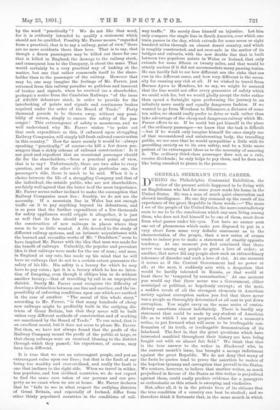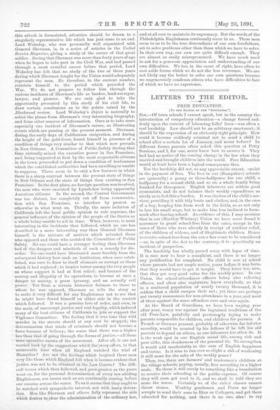GENERAL SHERMAN'S CIVIL CAREER. D URING the Philadelphia Centennial Exhibition, the
writer of the present article happened to be living with an Englishman who had for some years made his home in the United States. He was a man of much quiet observation and shrewd intelligence. He one day summed up the result of his experience of the great Republic in these words :—" The more I see of the people of the United States, the more contradictory seem to me to be the conclusions which any man living among them, who does not feel himself to be one of them, must draw from what passes under his eyes. You have no sooner seen one set of phenomena which make you disposed to put in a very short form some very definite statement as to the characteristics of the people, than a new series of events tends to induce you to make a statement of exactly opposite tendency. At one moment you feel convinced that there never was among any people so great a love of order ; at another, that never did any people show such an extraordinary tolerance of disorder and such a love of riot. At one moment it seems as if the Central Government had no power at all; at the next, it suddenly ants with a despotism that would be hardly tolerated in Russia, or that would at least there be ' tempered by assassination.' At one moment you would say that there never was a Government, either municipal or political, so hopelessly corrupt ; at the next, a sudden revolt of all the strongest elements in American society against corruption makes you feel that there never was a people so thoroughly determined at all oost to put down corruption. You might carry on the same series of contra- dictory assertions almost indefinitely. There is hardly any statement that could be made by any student of American life as to which I am not prepared, almost at a moment's notice, to put forward what will seem to be irrefragable con- firmation of its truth, or irrefragable demonstration of its falsehood. The fact is, that the great questions which have interested mankind throughout their history are here being fought out with an almost fair field." We think that that is the true answer to the writer in Blackwood who, in the current month's issue, has brought a savage indictment against the great Republic. We do not deny that many of the facts he quotes tend to prove the assertion he makes of the hopeless tyranny and corruption that prevail in the States. We venture, however, to believe that another writer, as much prejudiced in favour of the States as this writer is prejudiced against them, could easily produce evidence for a panegyric as enthusiastic as this attack is sweeping and vindictive.
But, after all, it is in the private lives of its citizens that the true condition of a country can best be studied; and we therefore think it fortunate that, in the same month in which this attack is formulated, attention should be drawn to a singularly representative life which has just come to an end. Lord Wolseley, who was personally well acquainted with General Sherman, is, in a series of articles in the United Service Magazine, giving a study of the career of that great soldier. Seeing that Sherman was more than forty years of age when he began to take part in the Civil War, and had passed through a most eventful career before that period, Lord Wolseley has felt that no study of the two or three years during which Sherman fought for the Union would adequately represent the man. He therefore, in the current number, restricts himself to the period which preceded the War. We do not propose to follow him through the various incidents of Sherman's life as banker, land-surveyor, lawyer, and pioneer. We are only glad to take the opportunity presented by this study of his civil life, to draw certain conclusions as to the points raised by the Blackwood review. Lord Wolseley's object is naturally to select the plums from Sherman's very interesting biography, and from other sources of information. Ours is to take more especially one incident of Sherman's career, as illustrating events which are passing at the present moment. Sherman, daring the early days of Californian emigration, and during the height of the gold-fever, found himself in presence of a condition of things very similar to that which now prevails in New Orleans. A Committee of Public Safety during that time virtually seized the executive power in San Francisco, and, being supported at first by the most respectable citizens in the town, proceeded to put down a condition of lawlessness which the established authorities had been unwilling or unable to suppress. There seem to be only a few features in which there is a sharp contrast between the present state of things in New Orleans and the state of things then existing in San Francisco. In the first place, no foreign question was involved, the men who were executed by Lynch-law being apparently American citizens. In the second, the Central Government was too distant, too completely cut off from communica- tion with San Francisco, to interfere by protest or otherwise in what went on. Thirdly, the same isolation of California left the local public opinion to rule supreme, the general influence of the opinion of the people of the States as a whole being unable to act in time. What, however, is most interesting in the incidents that followed, which no one hoe described in a more interesting way than General Sherman himself, is the mixture of motives which actuated those who opposed and those who assisted the Committee of Public Safety. No one could have a stronger feeling than Sherman had of the dangers and mischiefs of such a remedy for dis- order. No one could have illustrated more forcibly from the subsequent history how such an institution, when once estab- lished, was sure to draw to itself elements as corrupt as those which it had replaced ; to inspire terror among the very people on whose support it had at first relied; and because of the secrecy and illegality of its operations, to become at once a danger to society, a gross tyranny, and an actually evil power. Yet from a certain historical fairness to those to whom he was opposed, Sherman so tells the story as to make it very difficult for any Englishman not to see that he might have found himself on either side in the contest which followed. It was a genuine love of order, and even, in the main, of nneorrupt justice and real legality, which induced many of the best citizens of California to join or support the Vigilance Committee. The feeling that it was time that wild murder in the streets should at any cost be stopped; the determination that trials of criminals should not become a farce because of bribery; the sense that there was a higher law than that of going through the forms of justice,—all these were operative causes of the movement. After all, is one not carried back by the suggestions which:the:story offers, to that memorable time when all England watched the trial of Hampden ? Are not the feelings which inspired these men very like those which England felt when it became evident that justice was not to be obtained in the Law Courts? The diffi- cult issues which then followed, and grew greater as the years went on, for the personal determination of every law-abiding Englishman, are issues such as are continually coming before our cousins across the water. To us it seems that they ought to be watched with sympathetic interest, not with hasty detrac- tion. Men like Sherman and others fully represent the side which desires to:clear the administration of the ordinary law, and at all cost to maintain its supremacy. But the words of the Philadelphia Englishman continually recur to us. These men seem to us to be the true. descendants of our own forefathers, set to solve problems other than those which we have to solve. In their own way, our own are quite difficult enough. They are almost as easily misrepresented. We have much need to ask for a generous appreciation and understanding of our own difficulties. We too, in the cause of right, have often to cast aside forms which we do not the less reverence. We are not likely any the better to solve our own questions because we ungenerously condemn others who have difficulties to face- of which we have no experience.



































 Previous page
Previous page